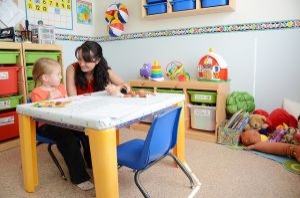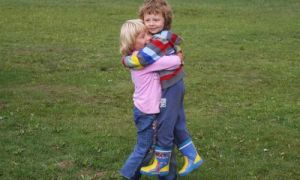The following article provides information on Expectations, Documentation Requirements, Tips and Hacks to help you navigate within the work environments as a first-time ECT graduate.
Expectations Of An ECT
Key Responsibilities
-
Child Development: Focus on the holistic development of children, including their physical, emotional, social, and cognitive growth.
-
Curriculum Implementation: Plan and implement age-appropriate learning activities and programs based on the Early Years Learning Framework (EYLF).
-
Assessment and Reporting: Regularly assess children's progress and provide feedback to parents and caregivers.
-
Health and Safety: Ensure a safe and healthy environment for children, adhering to health and safety regulations.
-
Collaboration: Work closely with families, colleagues, and other professionals to support children's learning and development.
Professional Standards
-
Professional Knowledge: Maintain up-to-date knowledge of early childhood education practices and theories.
-
Professional Practice: Demonstrate effective teaching practices and engage in continuous professional development.
-
Professional Relationships: Build positive and respectful relationships with children, families, and the wider community.
-
Professional Responsibilities: Adhere to ethical standards and legal requirements, including maintaining confidentiality and professional conduct.
Documentation and Reporting
-
Learning Stories: Document children's learning experiences and progress through learning stories and portfolios.
-
Observations: Conduct regular observations to inform your teaching practices and assessments.
-
Reports: Prepare and share reports with families to keep them informed about their child's development and achievements.
Inclusion and Support
-
Inclusive Practices: Implement inclusive practices to support children with diverse needs and backgrounds.
-
Cultural Competence: Respect and value the cultural backgrounds of all children and families.
-
Support Services: Collaborate with support services and specialists to provide additional assistance to children who need it.
Work Environment
-
Teamwork: Work collaboratively with other educators and staff to create a positive learning environment.
-
Professional Development: Engage in ongoing professional development to enhance your skills and knowledge.
-
Work-Life Balance: Manage your workload effectively to maintain a healthy work-life balance.
Documentation Requirements
As an Early Childhood Teacher (ECT) in Australia, there are several key documentation requirements you need to be aware of:
Educational Program Documentation
-
Educational Program: Develop and maintain an educational program that aligns with the Early Years Learning Framework (EYLF) and contributes to the five learning outcomes.
-
Child Assessments and Evaluations: Document each child's developmental needs, interests, experiences, and participation in the program. This includes assessing their progress against the outcomes of the educational program.
-
Learning Stories and Portfolios: Use learning stories and portfolios to document children's learning experiences and progress. This can include photographs, videos, and written observations.
-
Display and Accessibility: Display information about the educational program in a place accessible to parents and have a copy available for inspection on request.
-
Parental Communication: Provide parents with information about the program, their child's participation, and copies of the documents kept under regulation.
Professional Documentation
-
Resume/CV: Keep your resume updated with your latest skills, experiences, and achievements.
-
References: Have a list of professional references ready.
-
Certificates and Transcripts: Maintain certified copies of your qualifications, academic transcripts, and any relevant professional development certificates.
Compliance and Reporting
-
Regulatory Compliance: Ensure that all documentation complies with the National Quality Framework (NQF) and the Education and Care Services National Regulations.
-
Regular Reporting: Prepare and share regular reports with families to keep them informed about their child's development and achievements.
Inclusion and Support Documentation
-
Inclusive Practices: Document how you implement inclusive practices to support children with diverse needs and backgrounds.
-
Cultural Competence: Record how you respect and value the cultural backgrounds of all children and families.
Health and Safety
-
Incident Reports: Document any incidents or accidents that occur in the childcare setting and report them as required.
-
Health Records: Maintain up-to-date health records for each child, including immunization records and any medical conditions.
Tips For Working As An ECT
Build Strong Relationships
-
Engage with Families: Build strong, trusting relationships with families. Communicate regularly and involve them in their child's learning journey.
-
Collaborate with Colleagues: Work closely with other educators and staff members. Share ideas, resources, and support each other.
Stay Organized
-
Document Efficiently: Keep your documentation organized and up-to-date. Use digital tools to streamline the process.
-
Plan Ahead: Plan your activities and lessons in advance. Have a flexible schedule to accommodate changes.
Foster Inclusion
-
Embrace Diversity: Implement inclusive practices and celebrate the diverse backgrounds of your students.
-
Support Special Needs: Work with inclusion support programs to cater to the needs of children with disabilities or additional needs.
Enhance Professional Development
-
Continuous Learning: Participate in workshops, training, and professional development courses to stay updated with the latest practices.
-
Join Professional Networks: Become a member of professional organizations like Early Childhood Australia (ECA) for resources and networking opportunities.
Create Engaging Learning Environments
-
Stimulating Activities: Design activities that are engaging and cater to the interests and developmental stages of the children.
-
Safe Spaces: Ensure that the learning environment is safe, welcoming, and conducive to exploration and learning.
Manage Your Well-Being
-
Work-Life Balance: Maintain a healthy work-life balance. Take time for self-care and relaxation.
-
Seek Support: If you feel overwhelmed, seek support from colleagues, mentors, or professional counseling services.
Utilize Technology
-
Educational Apps: Incorporate technology and educational apps to enhance learning experiences.
-
Digital Portfolios: Use digital portfolios to document and share children's progress with parents.
Stay Informed
-
Regulations and Standards: Keep yourself informed about the National Quality Framework (NQF) and the latest regulatory changes.
-
Funding Opportunities: Stay updated on kinder funding and government subsidies that can support your programs.
Practical Hacks
-
Time Management: Use timers to manage transitions and keep activities on track.
-
Resource Management: Create a resource-sharing system with other educators to save time and costs.
Working as an ECT is incredibly rewarding, and these tips should help you navigate your new role with confidence. Is there anything specific you'd like to delve deeper into?
Practical Hacks
-
Color-Code: Use color-coded folders and labels for different subjects, activities, and children's files. It makes finding things quick and easy.
-
Prep Ahead: Prepare materials and activities the night before. Keep a 'ready-to-go' box with all essentials.
-
Digital Tools: Utilize digital planning tools and apps like Asana or Trello to keep track of tasks and deadlines.
Classroom Management
-
Visual Timetable: Create a visual timetable with pictures and words to help children understand the daily schedule.
-
Routine Charts: Use routine charts to establish consistent routines. It helps children know what to expect and reduces transitions' stress.
-
Engaging Transitions: Incorporate songs, games, or short activities to make transitions between tasks fun and smooth.
Teaching Techniques
-
Interactive Storytelling: Use puppets, props, and interactive storytelling techniques to capture children's attention.
-
Hands-On Activities: Incorporate sensory play and hands-on activities to make learning more engaging and memorable.
-
Flexible Seating: Provide different seating options like cushions, bean bags, and mats to create a comfortable and flexible learning environment.
Documentation
-
Digital Portfolios: Use apps like Storypark or Educa to maintain digital portfolios of children's progress. It saves time and keeps everything organized.
-
Observation Templates: Create templates for observations and assessments to streamline documentation.
-
Regular Updates: Set aside specific times during the week for updating records and documentation.
Inclusion and Support
-
Visual Supports: Use visual supports like picture cards and social stories to help children with communication and understanding.
-
Buddy System: Pair children up with buddies to promote inclusion and peer support.
-
Professional Networks: Connect with inclusion support services and specialists for additional guidance and resources.
Personal Well-being
-
Set Boundaries: Establish clear boundaries between work and personal life. Avoid taking work home whenever possible.
-
Self-Care: Prioritize self-care activities like exercise, hobbies, and relaxation to maintain your well-being.
-
Seek Support: Don't hesitate to seek support from colleagues, mentors, or professional counseling services if needed.
Additional Practical Hacks
-
Resource Swaps: Engage in resource swaps with other teachers to save money and diversify materials.
-
Reuse and Recycle: Get creative with recycled materials for arts and crafts projects.
-
Emergency Kit: Keep an emergency kit with essentials like band-aids, tissues, and extra supplies for unexpected situations.
Further Reading
Requirements for Early Childhood Teachers
ECT Qualified Educator Job Description
Early Childhood Teachers (ECT) Award Wages in Australia
Classification Levels For ECT's In Early Childhood Services
Classification Levels For ECT's That Do Not Hold Or Not Required To Hold Registration In Early Childhood Services
Actively Working Towards A Cert 3, Diploma Or ECT Qualification
Recognition for Primary School Teachers as an ECT







 Whether you are doing a Cert 3 or a Diploma traineeship or thinking about doing a traineeship it’s a good idea to understand what wages
Whether you are doing a Cert 3 or a Diploma traineeship or thinking about doing a traineeship it’s a good idea to understand what wages Work placement is an excellent opportunity for you to prepare and gain insight into the early childhood industry as well as help you to clarify
Work placement is an excellent opportunity for you to prepare and gain insight into the early childhood industry as well as help you to clarify Are you thinking of starting a traineeship in childcare? Well from personal experience, working in this child care industry brings great fulfilment and satisfaction. Watching
Are you thinking of starting a traineeship in childcare? Well from personal experience, working in this child care industry brings great fulfilment and satisfaction. Watching There is no truth to the rumour that the certificate III or 'actively working towards' will be phased out.
There is no truth to the rumour that the certificate III or 'actively working towards' will be phased out.
 For educators looking to update their qualification and have the required knowledge, experience and skills instead of completing assignments and tasks to complete a qualification
For educators looking to update their qualification and have the required knowledge, experience and skills instead of completing assignments and tasks to complete a qualification As a student finding information and doing research is an important part of completing assignments. Once you find the information you need to complete the
As a student finding information and doing research is an important part of completing assignments. Once you find the information you need to complete the Being a student and completing assessments can be a hard task. Especially when you don’t understand what the question is, you have to write an
Being a student and completing assessments can be a hard task. Especially when you don’t understand what the question is, you have to write an Hiring overseas educators can not only bring a service the benefits of a diverse, multicultural workplace but also address staffing shortage issues. However before an
Hiring overseas educators can not only bring a service the benefits of a diverse, multicultural workplace but also address staffing shortage issues. However before an As you take the next big step and decide to continue studying you need to decide whether you will be able to manage working at
As you take the next big step and decide to continue studying you need to decide whether you will be able to manage working at Making the decision to study is a big one. It can be stressful, thinking of how you're going to complete assignments or if you're going
Making the decision to study is a big one. It can be stressful, thinking of how you're going to complete assignments or if you're going


